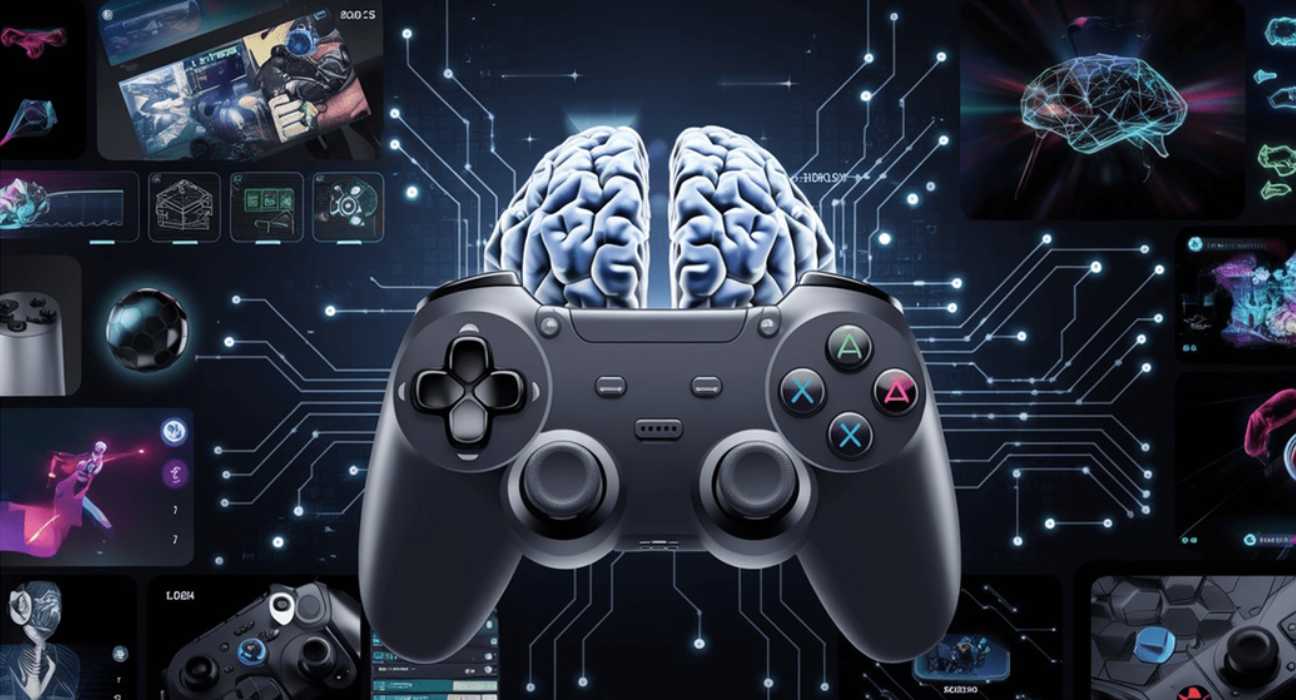Indeed, AI is changing the fate of industries around the globe and very few are feeling its impact than the gaming sector.
The AI of gaming has crossed boundaries – it’s moving forward, making games more immersive and personalized. Everything related to game development and playing has changed, and AI as well as machine learning technology is changing it.
Here we talk about the new revolution in a gaming experience-changing and improving with AI and machine learning-from AI in game design to its use powered game engines right up to the horizon of what will be AI in games.
AI in Game Design
Game design has always played into creating the most interesting and evolving environments for players, and AI is amplifying that process. AI in game design makes it possible to automate boring tasks with more creative ideas. Using AI, the designer can experiment on different types of environments, design complex character interactions, and even auto-generate level designs based on player preferences.
Procedural Content Generation (PCG)
Procedural content generation can hence be understood as the process of generating game content, such as levels, textures, and even worlds. That is the area in which machine learning integrates with PCG, hence very different from what many people know about transforming on the behavior of a player. That’s why the highly hyped No Man’s Sky seemed to promise so much, with an AI-generated planet and ecosystems mayn’t provide the same world to two different players, hence ensuring freshness as well as replay value in gameplay.
Gaming Machine Learning: Revolutionizing User Experience
This domain of AI concerns the self-learning and self-improving functionality of machines whereby there is no explicit programming. With time, this algorithm learns the different types of interactions users have with the game and accordingly brings in real-time gaming activities for them in which the system customizes and changes them.
AI NPC Behaviour: Smarter Characters
These are non-player characters, simply NPCs that are integrated into the game environment-they add richness and a challenge. Traditionally, NPC’s behavior was predictable and prescribed in advance. Now with the employment of machine learning, AI behavior among these NPCs enables such NPCs to learn from the players and modify their strategies while still reacting in real time, changing the nature of the game.
For instance, Middle-Earth: Shadow of Mordor uses the Nemesis System where it suggests that the non-player characters would remember the actions undertaken by the player and change their action appropriately. Hence if you were able to defeat an NPC, then most probably the Nemesis System would bring him back later in time due to his previous defeat just to present the gamer with a more daunting task.
Game AI Analytics: Advanced Gaming Mechanics
AI-driven analytics would allow the game developer to track what his players do, and what they like and engage with. The AI game analytics solution would, thus process large masses of gameplay data in real time so that game developers could examine fine-tuning game mechanisms and optimizing the difficulty levels of each of the levels in conjunction with predicting the future behavioral outcome of the players.
A wonderful secondary example of AI analytics is with the game Overwatch. Blizzard utilizes AI to flag abusive behavior and through machine learning algorithms traces patterns both in text chat and gameplay-that flags problematic players, yet also enhances the general community experience.
AI in Game Development
AI also proves to be a very valuable tool for game development; it automatically performs tasks that require much time to humanly calculate and will free a lot of creativity from a developer while coming up with new innovative games. Game developers are now using AI-based game development tools, saving much time and resources that can consume the time testing, bug fixing, and optimization of the gameplay.
AI Game Engines: Efficient Development Driver
Already game engines have become much more powerful so far with the capability to be powered by AI, and this is a potential as, with such an AI-driven game engine, developers will be able to put together high detail-intensive environments and even more complex game mechanics at an even faster pace. These AI tools would come in the form of interfaces integrated into the Unity and Unreal Engine game engines, assisting the developers directly in streamlining and automating tasks like pathfinding, NPC decision-making, collision detection, among many others. In incorporating all these AI capabilities within the game engine, the developers optimize the experience enjoyed by the gamer in improved graphics and smoother gameplay.
- Unity: The ML-Agents toolkit enables developers to train intelligent agents that can adapt and be able to learn in games. Pricing: Personal is free, Paid plans start at $399 per year.
- Unreal Engine: Unreal’s AI tools offers features such as behavior trees for AI decision-making and navmesh pathfinding. Completely free to download, then a 5% royalty fee on gross revenue above $1 million.
Most interesting developments involving AI in gaming include creating individual experiences for everyone. Machine learning allows tracking the player’s preferences, habits, and skill levels to tailor gameplay exactly for each player. Thus, no two players will play the game under similar circumstances.
Adaptive Difficulty
Fixed difficulty levels are out. Just like Resident Evil 4, the games change their difficulty levels with respect to how the player performs during the gameplay. If he’s doing great continuously, it will then throw harder challenges at the player, but if he is having problems with specific levels, then it will become easy for him to play the game. However, machine learning follows the input from the player while dynamically changing the difficulty for better smoothness.
Player-Centric Storylines
Other influential elements that are part of the system are AI. In its dynamic storytelling, AI was also integrated into change at the choices of the player. An example of this is in Detroit: Become Human where its storyline branched; the game choices actually affect it, and in turn, makes the story very personal and emotional.
AI in Game Testing and Quality Assurance
There is also the introduction of AI in game testing and quality assurance. Probably one of the most time-consuming areas of game development is testing. Because modern games are so complex, comprehensive human testing cannot do justice; hence a myriad of potential bugs and glitches and performance issues can be found which AI now automates much of the process involved in detecting bugs and glitches and performance issues much quicker and more efficiently than human testers.
Auto-Detection of Bugs
This is great because AI can identify probable bugs or where a game might crash on thousands of simulated gameplay scenarios. Thus, it aids in allowing more detailed and fast automated testing, which will finally usher stability to games that have been released. Ubisoft already uses AI tools to test their game Assassin’s Creed; this helps identify the bugs that could slip past regular QA processes.
Future of AI in Gaming
Games have come closer to lifelike immersion, dynamism, and personalization with the new definition of AI and machine learning. In fact, quite a few forthcoming developments relate to real-time game adjustments and more lifelike AI NPCs or AI-driven game narratives.
AI as a Creative Partner
Let us think about the future tools of AI, able to collaborate with game designers to create entire environments, characters, even storylines of a game. Here, almost infinitesimally small teams of developers would be able to create truly highly large-scale games in AAA quality without the massive budgets characteristic of contemporary top-tier studios.
AI-Generated Content
It may not only make procedurally generated content possible in a game but also allow AI to generate completely new game content, targeted at the player’s preferences, real-time. The game world that changes not just the level of difficulty but also landscape, NPC’s action toward the player and even storyline based on how you play might soon be made in a near future.
Problems of AI in Gaming
Of course, AI has revolutionized gaming in a tremendous way but is not without its problems. First and foremost, the application of AI systems is computationally intensive and will always take a lot of time, too. And add to this, AI-generated content- if done thoughtlessly- can sometimes be bound to feel unnatural or lack the depth it would carry if were human-generated.
There is also privacy on that account because the AI system relies on big player data to be effective. The developers would need to collect responsibly player data, to use in such a game, or otherwise and to follow any pertinent data protection legislation.
Also, check out Janitor AI, an interesting chatbot which is gamifying the whole chat experience and taking the world by storm!
Conclusion
This type of progress in the gaming world created by AI will make future games smarter, more personable for the gamer, and better streamlined within their process to further experience games. Real-time adaptation through machine learning is this technology’s promise; it could mean that the experience levels of the player are taken into account so that every experience will be unique and different. This means that the effect from AI NPC behavior to AI-driven game development would range.
With advancements in virtual worlds, the real and virtual worlds will definitely be indistinct. This simply means that the experiences a gamer could enjoy would be more real and personalized compared to what they have right now.

